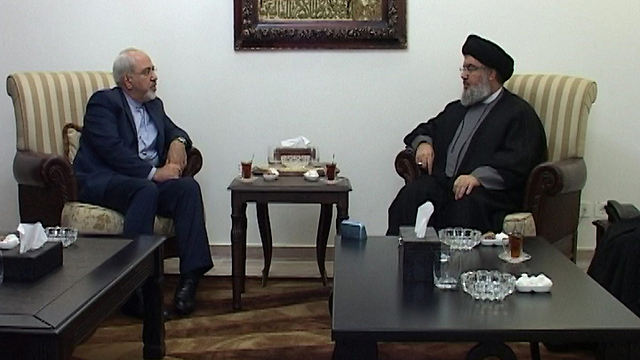
ISIS execution. As bad as Assad and his supporters
A war of evil vs. evil
Op-ed: The Islamic State poses a much smaller threat to Israel than the Iran-Syria-Hezbollah-Hamas axis. An ISIS defeat will strengthen the axis of evil's power of destruction - a disastrous outcome for Israel.
The war in Syria is not a war of good guys versus bad guys. It’s a war of evil versus evil, and it's not that easy to decide which side is worse.

Syrian President Bashar Assad massacred his people and turned millions of them into refugees. His rivals are terror organizations, including extensions of al-Qaeda and the Islamic State, which are as bad as he and his supporters are.
The issue of a war of evil versus evil has been raised quite a few times in the past. In June 1941, in World War II, during an all-out war between Nazi Germany and Britain, Germany decided to invade the Soviet Union in Operation Barbarossa. The years before the invasion saw dreadful horrors take place in Joseph Stalin's Soviet Union, not to mention the alliance with Germany - the Molotov-Ribbentrop Pact - and the Russian invasion of Poland. Those days, the West was gripped by strong fear, not only of Nazi Germany but also of communism and the Soviet Union.

Hezbollah leader Hassan Nasrallah with Iranian Foreign Minister Mohammad Zarif. The situation won't change even if Assad is removed, as long as Syria is controlled by a leadership linked to Iran and Hezbollah (Photo: AFP) (צילום: AFP PHOTO / HEZBOLLAH PRESS OFFICE)
At this stage, British Prime Minister Winston Churchill was forced to make a decision. He may have been able to sign a peace agreement with Germany, spare the blood of British soldiers for at least a few years and leave Russia on its own against the Nazi enemy. But Churchill, the biggest hater of bolshevism, made the right decision and chose to stand by the Soviet Union.
After the war, this decision claimed a price - countries like Poland and the Czech Republic remained under the Soviet Union's oppressing communist rule for many years. Nonetheless, it was far better than the Nazi rule.
But the choice is not always clear, and the right decision is not always made. The Western powers brought down Hosni Mubarak in Egypt and Muammar Gaddafi in Libya, for ideological reasons and against their clear interest.
In many cases, however, world powers decide not according to the level of evil, but in order to get rid of what they see as the most concrete danger to them. In the great rivalry between the rulers of evil - Saddam Hussein in Iraq and the ayatollahs in Iran - the United States and Britain chose to topple Hussein, under the argument - which was proven false - that he has or is about to produce weapons of mass destruction. The result was that Iran grew immensely stronger.
We are now facing another dangerous stage as the Iran-Syria-Hezbollah-Hamas axis grows stronger. Israel chose to accept Hamas' rule of Gaza. From a Russian point of view, the ISIS terror puts Russia in danger while the Hezbollah and Iranian terror is not directed at the Russians. The European and American point of view is similar. ISIS is openly acting against the West. The Iranian and Hezbollah terror threat is limited to our region - mainly to Israel, but also to the Gulf state - and "at the most," it is also directed at Jews outside the region.
But from Israel's point of view, things are different. ISIS poses a much smaller threat to us, at least in the short run, while the axis of evil poses a clear and imminent threat, as all parts of the axis are not hiding their intentions towards us.
Now it turns out that the entire world is rising up against ISIS and is expected to strengthen the Iran-Syria-Hezbollah-Hamas axis, a disastrous outcome for Israel. The situation won't change even if Assad is removed, as long as Syria is controlled by a leadership linked to Iran and Hezbollah.
Israel's ability to act is very limited. We are isolated in the world. Our relationship with Turkey, which also has an interest in the battle in Syria, is in a crisis, and even our relations with the US have deteriorated in recent years. Israel's attempts to influence the global police have failed, like in the case of the nuclear agreement with Iran.
Nonetheless, we should not give up the option to warn that an ISIS defeat, without simultaneously reducing the Iran-Syria-Hezbollah axis' power of destruction, is a serious threat to Israel and not only to Israel. The US elections are drawing near, and maybe there we will find someone who will listen.
Prof. Daniel Friedmann served as Israel's justice minister from 2007 to 2009.










